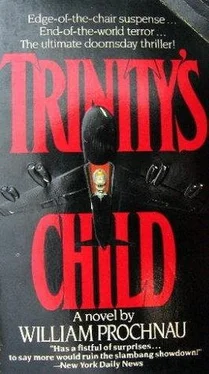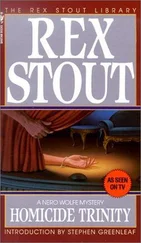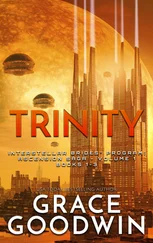Something would have to give … The President read huriedly, but part of his mind drifted to his triumphant return from Vienna and the summit meeting with the young, new, and presumably inexperienced Soviet Premier. On the flight over, the Secretary of State had badgered him for hours about being tough. The Soviets, the Secretary had said, are like burglars who walk down a hotel hallway trying every door until they find one unlocked. Lock every door on them, Mr. President. During the summit conference, the Premier had surprised him. He had almost pleaded with him to back down on the weapons buildup. The President had stonewalled, as prompted, telling the Premier to loosen his grip on Eastern Europe if he wanted to talk arms reductions. On the return flight the Secretary gloated ecstatically. This was a complete affirmation of the administration’s policy. The new toughness had left the Soviets in an American policy pincer movement. The Soviets were trapped with an ailing economy, the Secretary beamed, and the Vienna meeting had forced them to make choices among escalating arms costs, the relentless ruble drain needed to prop up the satellite nations, and the increasingly tense internal pressure for consumer goods demanded by a deprived citizenry. Now something would have to give, the Secretary enthused, and it could even be the Soviet system itself.
“…I confess, Mr. President, to a persistent fantasy. I had fantasized that proliferation of nuclear weapons among other nations was a good thing. Perhaps two less stable nations, with small arsenals, would use their weapons first and take the monkey, to use your idiom, off our backs. Perhaps a million people would have been killed, but the horror would bring both our nations to their senses. We had no such luck. The monkey remains on our backs, his claws dug in deeply. At best, now, we can become the symbols that my fantasy would have passed on to other nations. To be blunt, Mr. President, you have three choices, only two of which are acceptable to us. You can accept the damage and we will stop, the world divided between us as it is now. Like you, I am a politician. I cannot imagine my political system allowing me to accept that choice, as clearly as we would prefer it. Your second choice is to respond with a limited counterattack that inflicts upon my nation a similar amount of military damage and other losses. We will accept that, provided the world’s spheres of influence remain the same and the arms increase cease. Our calculations show that you will lose six to nine million persons in our attack. We will accept a similar loss. It is a tremendous price to pay. But perhaps it can serve as the symbol my fantasy would have granted to Riyadh or Islamabad. Perhaps, without ending all our aspirations, it can show all factions in both our nations the madness of the game we have been playing. The losses are huge, but smaller and more survivable than the world’s losses in earlier wars. It has a certain raw logic—considerably more than your third choice, which is not acceptable to us. You will be under tremendous pressure, as was I, to respond massively. If this is your ultimate choice, my government already has decided to reply in kind, even before your missiles land. I pray now, Mr. President, that the distrust is not total and that, through the pain of the next few minutes, you make the decision that can bring this to a less-than-perfect end, but an end.”
Halupalai slapped O’Toole hard, very hard, the snapping impact of the blow cracking through the rising engine noise like shattering glass. O’Toole did not flinch. Halupalai’s eyes adjusted slowly to the red night lights of the cramped upper crew compartment. At O’Toole’s side, just below the code box, the young airman’s underwear and flight jacket lay in a discordant heap. O’Toole stood woodenly over the box, his hands clasped between his legs, as if to warm them. Halupalai struck him again, his open hand whipsawing back and forth across O’Toole’s face.
“Mama,” O’Toole mouthed through the noise, his hands pulling up quickly, then dropping helplessly at his sides.
The noise from the B-52’s eight jet engines rose in a whining crescendo. Halupalai’s mind cartwheeled in a jumble of thoughts. What was the matter with O’Toole? In the dim light he could barely see him. But this was such a routine function—a simple, simultaneous key turn with separate keys, then an elementary working of separate, but simple, combination locks. They had done it scores of times together, quickly and efficiently providing the data that enabled Kazakhs to say no-go and shut down the engines. Now Kazakhs was cursing them on the radio. But O’Toole wasn’t even wearing his helmet and couldn’t hear the curses.
Halupalai hit him again, a high blow above the cheekbone, and the Hawaiian felt a sharp splinter nick at his hand. His vision sharpened, he saw that O’Toole’s eyebrows were frozen white in ragged shards of ice. Halupalai winced for the poor bastard. He’d been in the damned shower again. He had to get out of here fast. But no one was getting out of the B-52, which was as cold as the freezing outside air, until the code box was open.
“Gunner!” Kazakhs rasped into Halupalai’s earphones. “Maybe you’d like a Russian heat-seeker up your rosy-red patooie? Get the codes! Now!”
Briefly Halupalai bristled. “I’m dealing with a block of ice back here, commander,” Halupalai snapped. “O’Toole’s soaking wet, frozen like a damned side of beef. I can’t get him to move.”
“Kick him in the balls. Do something. O’Toole, you son of a bitch, if Halupalai doesn’t kick you in the balls, I’ll come back there and you’ll never use those precious jewels of yours again.”
“He can’t hear you, sir. His helmet’s off.”
“Jesus. Hook him up.”
Halupalai jammed the white helmet over O’Toole’s unmoving head and attached the radio joint.
“O’Toole? Can you hear me, you icon-worshiping Irish potatohead?”
“Mama,” O’Toole replied.
“Oh, Jesus wept,” Kazakhs groaned.
“As well He might,” Moreau added.
“Shut up, Moreau.”
“You’re the aircraft commander, commander.”
“And what would you do, copilot?”
“Go back there and warm him up, one way or the other.”
“That’ll be the day.”
Moreau unsnapped her shoulder harness, pulled off her helmet, reached in a pocket for the standard red-filtered penlight, and wheeled out of her seat. The tiny beam of light wobbled toward the two dark figures a dozen feet away. Approaching Halupalai, she motioned for his helmet. Then she turned on the immobile pillar of O’Toole.
“Lieutenant O’Toole,” Moreau snarled, her voice grinding like a penny in a vacuum cleaner. “We are in combat conditions. Give me the key.”
O’Toole stood mesmerized by the steel-blue eyes glinting out of the soft red halo of Moreau’s helmet. His lips began to move wordlessly.
“The key.” The penny rattled up the vacuum tube.
“Sun… cur… ury,” O’Toole mumbled. “Security vi…lay… shun.”
“Then do it yourself, lieutenant. Do your duty. Now. Right now.”
“Mama,” O’Toole reverted.
“Jesus,” Kazakhs interrupted. “Kick him in the gonads. I’m not kidding, Moreau. Kick him in the balls.”
Moreau edged closer to O’Toole, slid the helmet visor down so her head was almost fully encased, and placed the penlight on her chin, shining the red rays up inside the visor. Halupalai took a step back at the vision.
“Give me the key,” Moreau repeated, her voice turned softly singsong.
O’Toole stared, his eyes widening in fear.
“Give me the key,” the haunting rhythm of her voice insisted.
“Angelus mortuorum,” O’Toole murmured.
Читать дальше












